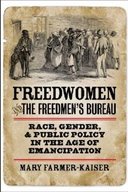Reconstruction
SS5H2 The student will analyze the effects of Reconstruction on American life.
a. Describe the purpose of the 13th, 14th and 15th Amendments
b. Explain the work of the Freedman's Bureau.
c. Explain how slavery was replaced by sharecropping and how African-Americans were prevented from exercising their newly won rights; include a discussion of Jim Crow Laws and customs.
a. Describe the purpose of the 13th, 14th and 15th Amendments
b. Explain the work of the Freedman's Bureau.
c. Explain how slavery was replaced by sharecropping and how African-Americans were prevented from exercising their newly won rights; include a discussion of Jim Crow Laws and customs.
Effects of the War on the North
|
Effects of the War on the South
|
Reconstruction
The Reconstruction Era, was the time just after the Civil War ended when the United States was trying to recover from war and learn how to get along again. Slaves were free, but what could they do? The 13th-15th amendments were passed to help them gain their rights, but then the Jim Crow laws came about, which kept many blacks from being able to use those rights until the Civil Rights movement in the 1950's and 1960's.
Freedmen's Bureau
The Freedmen's Bureau was an organization that was created after the American Civil War to help freed slaves. The Bureau helped former slaves find lost family members, gain land, get an education, get health care and provide legal help in regards to work contracts with white land owners. You can learn more about the Freedman's Bureau here. I also highly recommend the book "40 Acres and Maybe a Mule," which is the story of several freed slaves and their quest for land ownership. They have several encounters with the Freedmen's Bureau. You may read this book in your reading class.
Sharecropping Replaces SlaverySlaves became free after the Civil War, however, what could they do? Many of them began working for the plantation owners again, this time not as slaves. These former slaves still had a very tough life. Sharecroppers often had to give 50% of their profit from farming to the landowner. Each year, sharecroppers would make just enough money to survive, but not enough to get ahead. You can get a more advanced description of sharecropping here. I also highly recommend you read the book "Roll of Thunder , Here My Cry," by Mildred Taylor. This would be a great book to read with you mom or dad.
Amendment ProcessWhat if the law needs changed? Simple. The lawmakers can propose a change or amendment. What is not so simple is convincing enough people that it needs to change. More than 11,000 amendments have been proposed, but only 27 of those new amendments passed. Ten of those amendments (Bill of Rights) were approved at the same time. Only 17 new amendments have passed since the Bill of Rights was approved in 1791. So how can a new amendment get passed:
Step 1: A congressman must propose that a new amendment needs to be passed (often times at the request of their constituents or the people they represent). Step 2: Two thirds of the U.S. House of Representatives and two thirds of the U.S. Senate must pass the amendment. Step 3: Three fourths of the states must ratify (approve) the new amendment. |
13th-15th Amendments
Jim Crow Laws
The Jim Crow laws were laws which began at the end of Reconstruction (1870's) and kept blacks from using the rights guaranteed by the 13th-15th amendments. The phrase most commonly associated with the Jim Crow Laws is "separate but equal." People said they were still giving blacks "equal" rights, but they were just giving them those rights while keeping them separate from whites. They were not treated equally.
|
